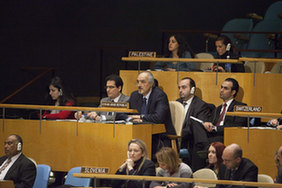
UN passes Syria resolution
Xinhua, February 17, 2012
-

Syria's ambassador to the United Nations Bashar Ja'afari (C) addresses the General Assembly at the United Nations in New York Feb 16, 2012.
The UN General Assembly on Thursday adopted a resolution supporting the political transition in Syria, plagued by an 11-month political crisis, and calls for the appointment of a UN special envoy to the Middle East country.
The draft resolution, which was drawn up by Saudi Arabia and introduced to the 193-member General Assembly by Egypt, was adopted with a vote of 137-12 with 17 abstentions.
It is similar to the draft vetoed at the UN Security Council on February 4 by Russia and China, two permanent members of the 15-nation Security Council. The vetoed draft asked Syrian President Bashar al-Assad to hand over power to his deputy.
The General Assembly "fully supports" the AL's January 22 decision "to facilitate a Syrian-led political transition to a democratic, pluralistic political system, in which citizens are equal regardless of their affiliations or ethnicities or beliefs, including through the commencement of a serious political dialogue" between the Syrian government and the opposition in accordance with an AL timetable, the resolution said.
Syria has flatly rejected the AL plan on its political transition, and foreign intervention in its "internal affairs."
The General Assembly requested "the secretary-general and all relevant UN bodies to provide support to the efforts of the League of Arab States both through good offices aimed at promoting a peaceful solution to the Syrian crisis, including through the appointment of a special envoy (to Syria), as well as through technical and material assistance," the resolution said.
In explanatory remarks after his vote at the General Assembly, Wang Min, the deputy Chinese permanent representative to the United Nations, said, "We do not approve of armed intervention or forcing a so-called 'regime change' in Syria. We do not believe that sanctions or the threat of sanctions is helpful to achieving an appropriate solution."
"Actions of the international community and the United Nations on the issue of Syria should be helpful to easing tensions, facilitating political dialogue and resolving differences," Wang said. "Such actions, instead of complicating the issue, should be helpful to maintaining peace and stability in the Middle East and upholding unity of the international community."
"We condemn all acts of violence against innocent civilians and urge the government and all political factions of Syria to immediately and fully end all acts of violence, and quickly restore stability and normal social order," he said. "We call on the government of Syria to pay serious heed to the people's legitimate desire for reform and development," he said, adding "we call on the various political factions in Syria to express their political aspirations through non-violent means under the rule of law."
The resolution expressed "grave concern at the deterioration of the situation in the Syrian Arab Republic, in particular the ongoing human rights violations and use of violence by the Syrian authorities against its population."
It "strongly condemns the continued widespread and systematic violations of human rights and fundamental freedoms by the Syrian authorities, such as the use of force against civilians, arbitrary executions, the killing and persecution of protestors, human rights defenders, and journalists, arbitrary detention, enforced disappearances, interference with access to medical treatment, torture, sexual violence, and ill-treatment, including against children."
The General Assembly "calls upon the the government of the Syrian Arab Republic to immediately put an end to all human rights violations and attacks against civilians, protect its population, fully comply with its obligations under applicable international law," the resolution said.
The General Assembly "condemns all violence, irrespective of where it comes from, and calls upon all parties in the Syrian Arab Republic, including armed groups, to stop all violence for reprisals immediately, in accordance with the League of Arab States initiative," it added.
The resolution stressed "the importance of ensuring accountability and the need to end impunity and hold to account those responsible for human rights violations, including those violations that may amount to crimes against humanity."
The General Assembly "calls for an inclusive Syrian-led political process, conducted in an environment free from violence, fear, intimidation and extremism, and aimed at effectively addressing the legitimate aspirations and concerns of the people of the Syrian Arab Republic, without prejudging the outcome," the resolution said.
It also "calls upon the Syriana authorities to allow safe and unhindered access for humanitarian assistance in order to ensure the delivery of humanitarian aid to persons in need of assistance."
The General Assembly "requests the secretary-general to report on the implementation of the resolution, in consultation with the League of Arab States, within 15 days of its adoption," the resolution said.
Before the assembly vote, Bashar Ja'afara, the Syrian permanent representative to the UN, told the General Assembly that "the adoption of this draft resolution will lead to more violence in the region as a whole."
The co-sponsors rejected any proposed amendments, Ja'afara said, adding the draft resolution violates sovereignty of Syria and international law.
"We hope the United Nations and the international community would provide support to the government and the people of Syria. I did not say the government, but I said the government and the people of Syria, to face the challenge of extremism," he said, referring to his government's current fighting against armed groups in Syria. "No country can accept armed terrorists in its territory."